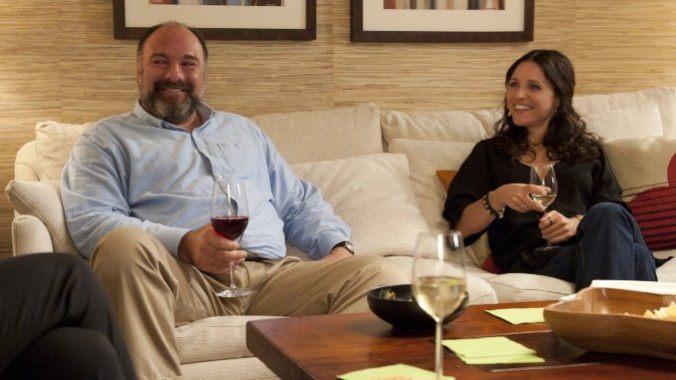Enough Said Cemented Nicole Holofcener as One of the Great Romance Directors

In an increasingly heightened cinematic landscape, Nicole Holofcener’s films live in the realm of markedly low stakes. Her films chart the slow dissolution of friendships and the prominent hurdles that make staying in relation with someone hard and time-consuming—uphill treks with occasional silly interludes urging people forward. Her work captures the mundane conversations that both mask and make life meaningful, meandering across their runtimes with a lack of foresight. Like a relational cartographer, Holofcener redefines familiar space, setting aside time to explore the many facets of a seemingly simple dynamic.
When her film Enough Said was released 10 years ago, it followed a run of lackluster yet commercially successful summer comedies like Grown Ups 2 and We’re the Millers. Were these films to be suspended in history, removed of any context, the digital camera and plasticized veneer of each, coupled with the recognizable stars helming them, would feel like common threads. But while those films are broad, crudely wringing laughs out of their audiences, Enough Said is deceptively careful, approaching its viewers with caution, threading the needle of each character’s worries with jokes born from a startling, real-world honesty.
The film follows Eva (Julia Louis-Dreyfus) and Albert (James Gandolfini), two divorcées wrestling with their impending empty nests. As they fall into a relationship, the reasons for them to break up grow, empty and cosmetic but gradually unignorable. All of this is ignited (or just prompted, depending on how much grace you are willing to extend to either party) by Eva’s friendship with Albert’s snobbish and bohemian ex-wife Marianne (played with wonderful wryness by Holofcener’s de facto muse, Catherine Keener). The plot is strung together, loosely structured around the steps in their burgeoning romance—the process of negotiation that both wedges them apart and keeps them together. Eva is the typical Holofcener hero, neurotic and deeply flawed, desperately trying to ascertain the shape and edges of her feelings rather than being swept away by an overflow of emotion.
Midway through Céline Sciamma’s Portrait of a Lady on Fire, Héloïse (Adèle Haenel) and Marianne (Noémie Merlant) are reclined on her bed, woven into one another. Héloïse asks: “Do all lovers feel like they’re inventing something?” There is very little shared DNA between Enough Said and Portrait of a Lady on Fire, but both films languidly circle around the same question, finding new and gentle ways to arrive at an answer. Holofcener’s movies have long been mining the wisdom born from falling in love, allowing her camera to walk alongside the protagonists. She observes the blossoming relationship inquisitively and lets it invent itself rather than follow a preordained track.
What both Sciamma and Holofcener are good at acknowledging is that the best romantic stories require a sense of discovery, encouraging their movies to uncover their subjects’ tastes and impulses alongside the audience watching along, everyone on equal footing. In Enough Said, Eva admits to her friend Sarah (Toni Collette) that Albert isn’t her normal type, growing on her over the course of their dates, all warm and easy in their flow. She falls in love with him alongside the audience. Their relationship clarifies in bed, as they laze around (much like Héloïse and Marianne) making jokes, filling the interstitial moments that bind big events together.
-

-

-

-

-

-

-

-

-

-

-

-

-

-

-

-

-

-

-

-

-

-

-

-

-

-

-

-

-

-

-

-

-

-

-

-

-

-

-

-








































